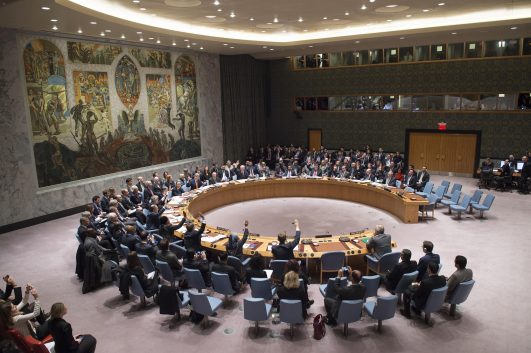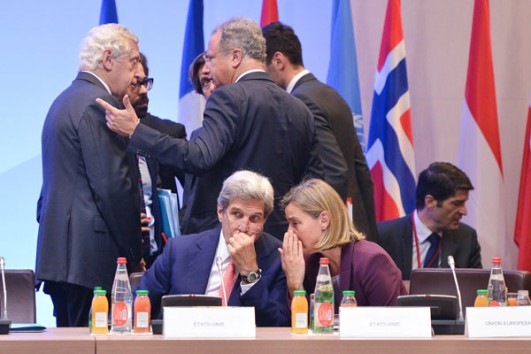The U.S. essentially admitted that its unyielding defense of Israel in the diplomatic arena was a disastrous strategy. With Obama bowing out, Europe will need to act on this lesson.

Shortly after the UN Security Council passed its resolution criticizing Israeli settlements on Friday, the U.S. State Department issued a press statement by John Kerry explaining Washington’s decision to abstain from the vote. Kerry said that their goal was to “preserve the possibility of the two state solution,” adding that “We cannot in good conscience stand in the way of a resolution at the United Nations that makes clear that both sides must act now to preserve the possibility of peace.”
Had they made that decision a year ago, Kerry and Obama might have left a meaningful legacy on the conflict; but this is not the case. Palestinians and Israelis have watched previous American presidents launch dramatic peace moves in the twilight of their administrations: Clinton with Camp David in 2000, and Bush with Annapolis in 2007. The late timing of these initiatives proved to be ineffective and even detrimental: they heightened the tensions and the stakes for the parties to agree on a rushed solution, and cast heavy doubt that any major decisions would survive under the next presidency (or under a new Israeli premiership).
This is why, contrary to what my colleague Dahlia Scheindlin argues, the Left has every reason to remain critical of the U.S.’s abstention. It is a failure of policy to be eight years late to a diplomatic move that could have had a significant impact on the conflict’s developments. It is a failure of principle to wait 36 years before allowing the Security Council to re-echo the U.S.’s own position that settlements violate international law. And it is a failure of political will to do all this just a month before the curtain closes on Obama’s presidency.
That being said, the abstention may still mark an important moment for the conflict. By withholding the veto, the Obama administration essentially admitted – intentionally or not – that its unyielding defense of Israel in the diplomatic arena was a disastrous strategy. Not only did the Israeli government personally disrespect Obama on a regular basis, it openly undermined U.S. policy by continuing to expand settlements and disparaging the very idea of a two-state solution. Now, with the incoming inauguration of Donald Trump, Obama knows that this lesson – which should have been learned long before Friday – will fall on deaf ears in the new White House.

The U.S.’s abstention is therefore not so much about sending a message to Trump or Netanyahu, both of whom will ignore the resolution the moment Obama leaves office. It is instead a message to other international actors – particularly its allies in Europe – about the need to end Israel’s impunity. As the world braces itself for a more bellicose and unpredictable foreign policy under Trump, it has become more vital for the EU and non-member European states to pressure Israel through their extensive political and economic ties which, despite diplomatic tensions, remain a centerpiece of Israel’s international relations.
This shift is hardly a comforting thought. Like the U.S., the EU remains glued to the defunct peace process and has failed to follow up on its critical statements with meaningful action. Even minor, less political issues – such as whether to demand compensation for EU-funded property destroyed by the Israeli army in Area C – are contested subjects among the EU members. Moreover, Europe is facing its own numerous problems from its shaky monetary union to the growing refugee crisis. The rise of the political right, including in major countries like the UK and possibly France, is also likely to have an impact on European positions vis-a-vis Israel and may further reduce the will to make any major moves in the conflict.
Nonetheless, with Obama bowing out, it is incumbent upon European states to continue removing Israel’s diplomatic cover. If the U.S. has finally admitted that it “cannot in good conscience” block the UN Security Council anymore, then Europe needs to step up its efforts to counter Israel’s destructive policies, starting with the de facto annexation of the West Bank. Anything less will simply re-confirm that, aside from a few occasional texts, the international community will do nothing to stop the apartheid reality that has unfolded, and that the Palestinians are on their own in fighting against it.


